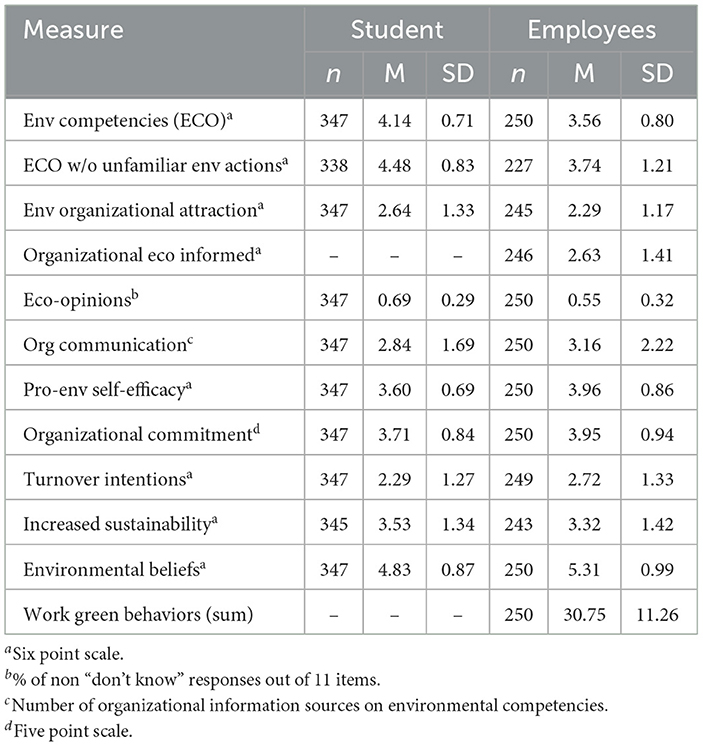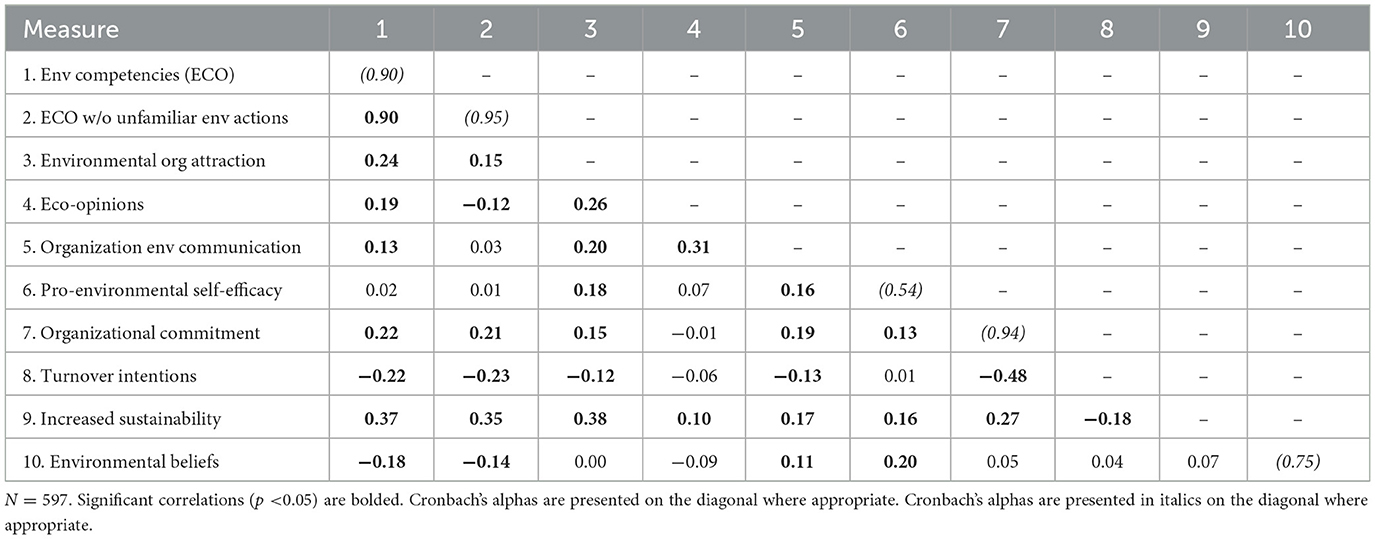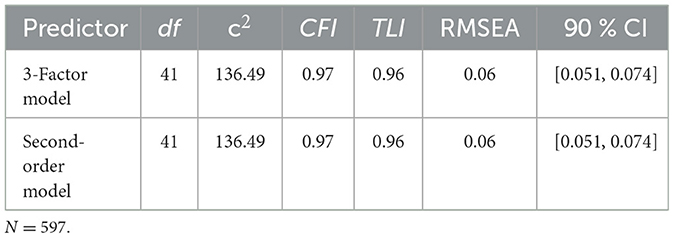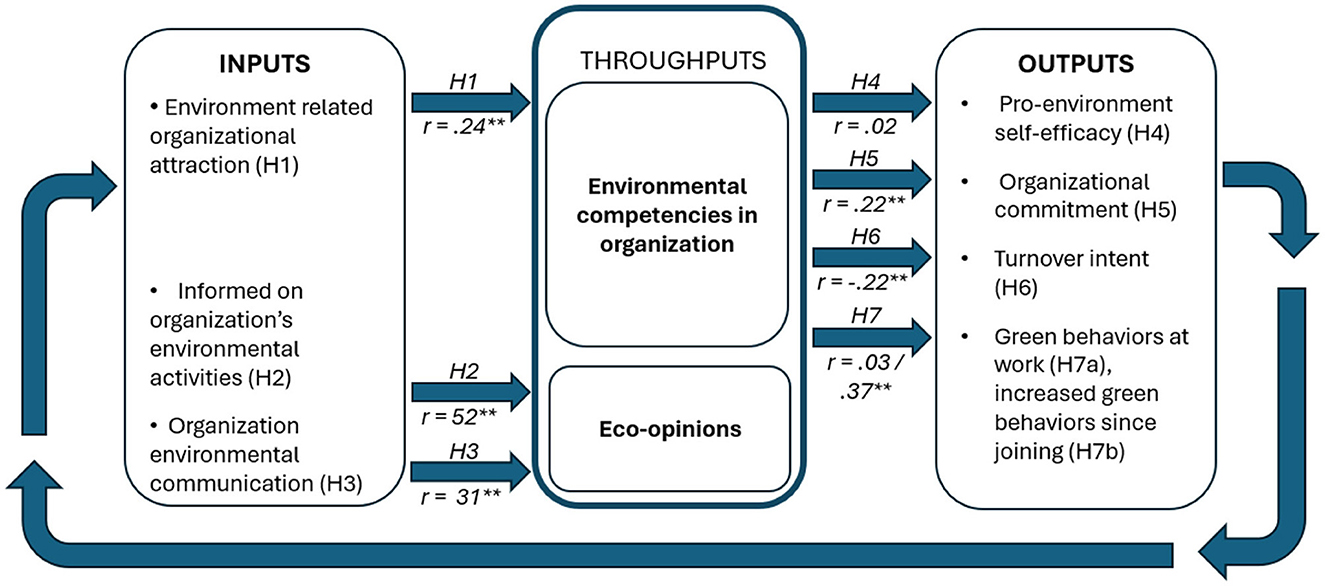- Department of Psychology, DePaul University, Chicago, IL, United States
Purpose: Understanding how internal stakeholders view an organization's pro-environmental impact supports understanding and coordination. These stakeholder appraisals of environmental competencies were predicted to positively relate to organizational attraction, pro-environmental self-efficacy, green behaviors, organizational commitment, and intentions to leave the organization. Being informed about an organization's environmental actions and having more organizational communication sources about sustainability were predicted to increase expressions of opinions (eco-opinions). The relationships of turnover intentions and organizational commitment with environmental competencies were predicted to be moderated by environmental beliefs, such that the relationships would be stronger the more concerned stakeholders were about the environment.
Method: Using a systems theory framework focused on psychological factors of environmental sustainability in organizations, we developed an 11-item scale of environmental competencies for organizations (ECO). Internal stakeholders appraised the effectiveness of organizations' environmental actions. The scale's relevance to the theory of planned behavior and communication literature were framed within the macro system of inputs, throughputs, and outputs of organizational environmental sustainability. A pilot test of the scale with 216 university students suggested a three-factor model for the stakeholder perceptions. Online survey responses from 587 additional participants from a different university (250 university employees and 347 students) also fit the same model and was used for hypothesis testing.
Results: Appraisals of environmental competencies were related to inputs like organizational attraction and outputs of organizational commitment, turnover intent, and increased green behaviors since joining the organization. Opinions about environmental competencies were more likely to be expressed when internal stakeholders felt informed of organizational activities and had more sources of environmental communications.
Conclusion: Large-scale changes in organizations require internal coordination across multiple systems, and internal stakeholders are key to these change efforts. Evidence suggests that the ECO scale is a useful tool for organizational sustainability insights and can contribute understanding on how the psychological system relates to, as well as amplifies or derails, organizational sustainability efforts.
1 Introduction
Large-scale changes in organizations are influenced by the external environment but also require internal coordination across multiple systems and individuals. This can be seen in environmental contexts, where the actions with the most potential to slow climate change and increase environmental sustainability are rarely controlled and implemented by a single individual. Many systems such as energy resources, transportation demands, or waste reduction, cut across many areas of the operations of an organization. Not surprisingly, systems theories have been applied to the study of environmentally sustainable actions in organizations and their impact (e.g., Davis et al., 2014; Flagstad et al., 2021; Strauss et al., 2017).
Systems theories describe the dynamic interconnections of organizational processes and change (e.g., Nadler, 1987). Open systems theory (Katz and Kahn, 1978), for example, views organizations as complex and dynamic with cycles of inputs, throughputs, and outputs. Inputs to organizational systems include energy and resources such as information, knowledge, communication, rewards, policy, leadership, job design, and organizational climate. Inputs become transformed in the throughput stage; these processes create the outputs of goods, services, ideas, or other resources. The resulting outputs impact the existing system of individuals, the organization, as well as the external environment. This cycle is tied to the organization's survival and growth and operates in a rich external environment that includes the natural environment, technology, market demands, legislation, and competition.
The system of organizational sustainability involves both physical and psychological aspects (see Figure 1). While employees can observe parts of the physical system underlying the sustainability efforts, the less visible psychological systems are key factors in supporting the organizational environmental efforts (e.g., Norton et al., 2015). For example, recycling cans around an organization serve as a part of the physical and observable system but the attitudes and beliefs that form the organizational climate and culture about recycling determine if materials are recycled successfully.
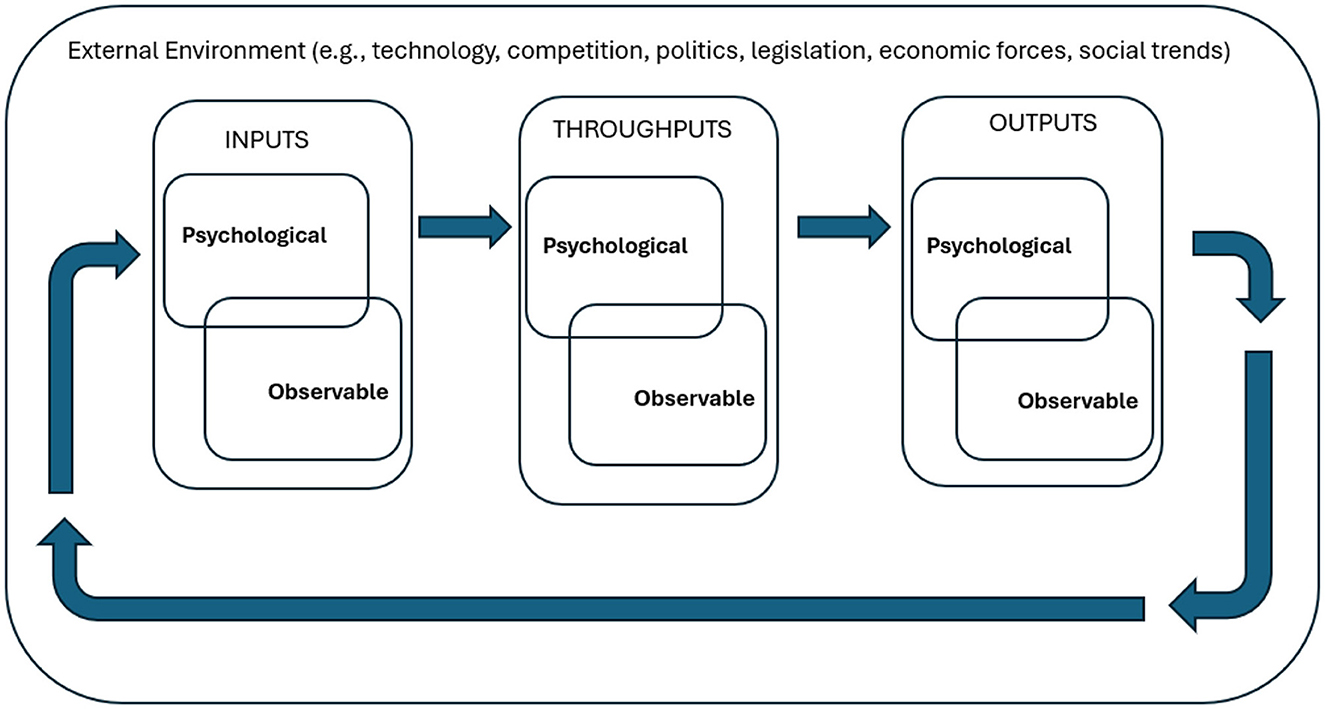
Figure 1. Overview of psychological and observable system of inputs, throughputs, and outputs in systems theories.
To better track the psychological system and stakeholder's views of the organization's green actions, we began by creating categories of environmental efforts in organizations. From this, we developed a scale (ECO) to assess how effective organization's environmental efforts are viewed and considered how appraisals of competencies are related to factors that involve internal stakeholders.
The psychological system, particularly internal stakeholders' views, plays a central role in an organization's environmental efforts. Stakeholder perspectives can serve as a pull toward or push away from an organization. Theories of person-organization fit theory (see Kristof-Brown et al., 2023) and attraction-selection-attrition theory (Schneider, 1987, 2001) hold that people are attracted to organizations that they see as compatible with themselves. Evidence suggests that an organization's pro-environmental actions are influential from branding perspectives relating to the external stakeholders (i.e., Kumar and Christodoulopoulou, 2014) as well as employee organizational attraction (Turban and Greening, 1997). Thus, we expected that individuals who are attracted to an organization because of its perceived environmental competencies would appraise the environmental competencies more positively.
Hypothesis 1. The more a stakeholder reports that environmental sustainability was important in choosing to join the organization, the higher the appraisals of their organization's environmental competencies.
Internal stakeholders bring unique experiences, perceptions, and judgments that can influence the success or failure of environmental efforts, as can be seen in Ajzen's theory of planned behavior (Ajzen, 1991; Norton et al., 2017). Previous research and meta-analytic path analyses support the theory that pro-environmental attitudes, subjective norms, and perceived behavioral control all influence pro-environmental intentions and employee green behaviors (Katz et al., 2022). Internal stakeholders are rich sources of ratings and information about environmental competencies. Glavas and Kelley (2014) point out that internal stakeholders will be more familiar with environmental actions than outsiders. They suggest that organizational insiders may be more aware of substantive actions rather than symbolic action than outsiders. Internal stakeholders often have a variety of information sources to draw on from within and outside the organization that influence perceptions.
Internal stakeholders are also influenced by communication and information on environmental activities. Welch and Jackson (2007) theorize on how internal communication fosters identification and engagement, which are precursors to employees feeling authorized to critique or support organizational strategies. Organizations that communicate environmental policies on sustainability efforts were found to have higher levels of employee environmental initiatives (Ramus and Steger, 2000). The actual policies mattered less than perceptions of the commitment and communication of policies. Communication sources and feeling well-informed are a precursor to offering ideas, critiques, and feedback. Thus, we expected that communication and being informed about the organization's environmental activities would be related to stakeholders' expression of opinions and evaluations about the organization's competencies.
Hypothesis 2. Internal stakeholders reporting being more well-informed of an organization's environmental actions will provide more opinions (i.e., ECO-opinions) on the organization's environmental competencies.
Hypothesis 3. Internal stakeholders reporting more environmental communication sources will provide more opinions (i.e., ECO-opinions) on the organization's environmental competencies.
The aspect of perceived behavioral control (e.g., self-efficacy) is another crucial psychological antecedent to intentions and behaviors (Ajzen, 1991). Self-efficacy is having confidence in one's ability for success in a specific situation (Bandura, 1997). Higher self-efficacy leads to higher levels of goals, increased efforts toward a goal, and higher goal related performance (Bandura 1997; Latham and Sejits, 2016). Pro-environmental self-efficacy has been associated with engaging in pro-environmental behavior (Abraham et al., 2015; Baldwin et al., 2023; Faraz et al., 2021; Katz et al., 2022; Schutte and Bhullar, 2017; Tabernero and Hernández, 2011). Self-efficacy increases with factors such as past successes, observing other people's successes, and positive feedback from others (e.g., Gist and Mitchell, 1992). Because each of these factors that are likely present in an environmentally competent organization, we expect that the more environmentally competent an organization is seen, the greater the internal stakeholder's pro-environmental self-efficacy.
Hypotheses 4. Internal stakeholders with more positive appraisals of an organization's environmental competencies will have higher environmental self-efficacy.
Consistent with the push and pull of organization attraction, organizational commitment has been linked to corporate social responsibility and environmentalism in several studies (e.g., Raineri and Paillé, 2016; Tilleman, 2012; Turker, 2009). Lower organizational commitment is one of many factors that drive turnover and intentions to leave an organization (Mathieu and Zajac, 1990). Meta-analytic results (Katz et al., 2022) find employee green behaviors to be positively correlated with organizational commitment, organizational identification, and job satisfaction as well as a host of other work perceptions. Likewise, if organizations are not compatible with views on corporate values, organization members can turn away or oppose organizations. Jones et al. (2016) used signaling theory to consider how perspectives on corporate social responsibility can affect job seekers to attraction, indifference, or being repelled. In the case of negative reactions, skepticism or mistrust of employers' messages seem to play a role (Jones et al., 2016). Misleading communication that is overly positive on environmental competencies (e.g., “green-washing,” Lyon and Montgomery, 2015) has been related to increased turnover intentions (Robertson et al., 2023).
Hypothesis 5 and 6. Internal stakeholders with more positive appraisals of environmental competencies in an organization will have higher organizational commitment (H5) and lower turnover intentions (H6).
Hypothesis 7. Internal stakeholders with more positive appraisals of environmental competencies in an organization will report greater increased green behaviors since joining (7a), and more green work behaviors (7b).
A systems approach suggests that each of these relationships and predictions would be influenced by many factors. One area of particular interest that relates to selection-attraction and attrition frameworks is the individual differences in beliefs and attitudes about the environment. Thus, individuals' beliefs about the environment (i.e., the degree to which individuals perceive climate change as problematic and supported by scientific consensus) may moderate how environmental competencies are associated with organizational commitment and turnover intentions. Consistent with the theory of planned behavior (Ajzen, 1991), those with pro-environmental attitudes would have more of a “pull” toward organizations with strong environmental competencies. On the other hand, strong environmental competencies are less of a pull toward the organization for individuals who are climate change skeptical.
Hypothesis 8 and 9. Internal stakeholders' environmental concerns will moderate the relationship between appraisals of environmental competencies and organizational commitment (H8) and turnover intentions (H9).
The hypotheses above were examined with data from internal stakeholders from two different universities. An increasing number of universities are integrating topics of climate change and sustainability skills into core curriculum (The Climate-Conscious College, 2023). University employees and students have many similarities to internal stakeholders at other types of organizations. Like employees, university students are stakeholders who decide to join or leave an organization as well as make choices about participation in environmental efforts. Both students and employees play a role in attracting others to the organization, influencing organizational reputation, as well as contributing adaptive or maladaptive environmental actions in the organization. Thus, given that internal stakeholders play an important role in universities and have similarities to organizational stakeholders in general, data were collected in organizations of higher education.
2 Methods and materials
As a first step, a scale was established to appraise the environmental competencies in organizations. Responses from 216 student participants were used to run exploratory analyses on the scale (e.g., EFA). Following this, data from 597 employee and student participants from a different university were used for a confirmatory test of the scale's factor structure and to test the hypotheses.
2.1 Scale development
Items were generated to create a scale to assess perceptions of the organizations' pro-environmental competencies. Items were developed with a deductive approach to item generation, following recommendations from Hinkin (1998). Dimensions for appraising the perceived effectiveness of environmental sustainability competencies were generated. This involved reviewing a variety of perspectives about environmental sustainability in organizations based on certifications, policy goals, and methods to quantify (e.g., B-corps; carbon footprint calculators; Berners-Lee, 2022; Johnson and Wilkinson, 2020; UNDP, 2024), along with conversations with professionals active in environmentalism in organizations.
The goal in creating the items was to specify broad categories rather than specific policies or behaviors. Broad categories were used to be applicable to a wide range of organizations and not tied to a specific context, industry, or current technology. For instance, the scale used a comprehensive category of “travel and commuting” rather than specifying fine-grained alternatives such as deliveries, fleet fuel efficiency, carpooling, biking, or public transportation use. Relatedly, having a practice available does not necessarily mean that it is effective or viewed as effective. Thus, the idea of competencies was used to keep the focus on impact and effectiveness rather than simply noting particular practices or behaviors that are in place or available.
Items were screened for clarity and redundancy with nine professionals. These subject matter experts (SMEs) had expertise in environmentalism, workplace assessments, or both. Additionally, student assistants reviewed items for clarity. Items were rated on the degree of perceived pro-environmental effectiveness. This scale had 11 environmental competencies for organizations (see Appendix for all items). We refer to the scale as Environmental Competencies for Organizations (or ECO).
The 11 item ECO scale was pilot tested with 243 university students. Pilot test data was collected from students in the research participant pool for introductory psychology courses at a large urban public university. Students were asked to evaluate their university's environmental competencies across the competency sectors. Other data were also collected in this administration, but only the ECO data is used for descriptive statistics and exploratory factor analysis from this pilot study. We excluded participants from this sample who missed two or more of the three attention checks in the full survey (n = 27), leaving 216 responses.
We conducted an exploratory factor analysis (EFA) on this pilot sample with the 11 ECO items to examine the underlying structure. The EFA was performed using principal axis factoring with oblimin rotation to allow for correlations among factors (Conway and Huffcutt, 2003). Results indicated that a 3-factor model [χ2(25) = 68.34, RMSEA = 0.09, TLI = 0.91, CFI = 0.96, BIC = −66.04] provided a significantly better fit compared to a 1-factor [Δχ2(19) = 113.93, p < 0.001] or 2-factor model [Δχ2(9) = 55.12, p < 0.001]. Although a 4-factor model yielded an even better fit than the 3-factor [Δχ2(8) = 34.96, p < 0.001], it resulted in some factors having only two items, which may lead to convergence issues (Hinkin, 1998). Therefore, we retained the 3-factor solution, with item loadings ranging from 0.28 to 0.93 and reasonably acceptable fit indices. The full results of this initial EFA are in Supplementary material.
2.2 Main sample participants
For hypothesis testing and confirmatory factor analysis of the ECO scale, data were collected at a different university in a different city than the pilot sample. This university was a large urban private university. Responses to an online survey included both students and employees. The student sample was from 398 students in the research participant pool for introductory psychology courses. For the employee sample, responses were collected from 256 faculty and staff (full and part-time) from 5,772 email invitations.
2.3 Procedure
All participants voluntarily responded to an online survey. The surveys were similar but were customized for students or employees. The student survey was designed to be completed in 25 min, while the employee survey was designed to be completed in 10 min.
2.4 Measures
2.4.1 Environmental competencies for organizations (ECO)
Participants rated the effectiveness of the organization's environmental actions with the newly created ECO scale. Eleven competencies were rated. The ECO used a 7-point scale of strongly disagree to strongly agree with an additional option of “don't know” (hereafter DK). DK was included as an option to minimize guessing or skipping the item if participants did not know about the actions. The proportion of DK responses across individuals was used as a source of data, and we also used two different approaches to create overall scale scores. In one approach, a DK response was assigned to a value of 3.5, the middle of the scale. In the second approach, a DK response was dropped and the overall score mean was computed without DK items. In addition to testing and reporting measures with both approaches, the number of responses without a DK were tallied for each participant and item and divided by total number of items for the ECO scale (11) to create a new variable called eco-opinions. The fewer the DKs, the larger the eco-opinions variable, which ranged from 0 to 100%.
2.4.2 Organizational attraction before joining
A single item on organizational attraction was modified from University of University of New Hampshire Sustainability Institute (2017) Student and Employee Culture Surveys. The item asked, “I considered environmental sustainability when I chose to enroll at [organization].” Ratings were made on a 6-point scale of strongly disagree to strongly agree.
2.4.3 Environmental organizational awareness
A single-item measure asked employees only about the degree of awareness of actions taken by the organization. The item was “I am well-informed about current environmental actions at (organization).” Ratings were made on a 6-point scale of strongly disagree to strongly agree.
2.4.4 Organizational communication
Participants responded to a checklist of information sources about the organization's pro-environmental actions. Options included formal (e.g., meetings) and informal sources (e.g., conversations with peers) of environmental information. Students could check any of the following categories: university emails, newsletters, brochures, university news, student-run news, university websites, postings or signs around campus, student orientation sessions, other students, in class or from professors, meetings or presentations, or sources outside university. Employees could indicate university news, student-run news, university websites, postings or signs around campus, employee orientation or HR sessions, colleagues; faculty or staff councils, program, department, or college meetings, in class or from students, meetings or presentations (e.g., symposia, town halls), sources outside university, or social media. Participants could also indicate other sources or if there are no sources. A count of information sources for each participant was created, and ranged from 0 to 10.
2.4.5 Pro-environmental self-efficacy
Four items asked about participants' confidence in their ability to take pro-environmental action. Items were modified from Jones's (1986) job self-efficacy measure. Modified items were (a) pro-environmental actions are well within the scope of my abilities, (b) I find it troublesome to deal with the requirements of pro-environmental action (reverse scored), (c) I have all the technical knowledge needed to take pro-environmental action, and (d) my knowledge to perform pro-environmental actions at [organization] is sometimes lacking (reverse scored). Ratings were made on a six-point scale of strongly disagree to strongly agree. An overall score was created by averaging across the four items.
2.4.6 Organizational commitment
Klein et al.'s (2014) unidimensional target neutral commitment measure assessed the degree of bond, dedication, and responsibility to the organization with four items. Ratings were made on a 5-point scale of not at all to extremely.
2.4.7 Turnover intentions
A single-item measure of intent to leave the organization asked, “How often have you seriously considered leaving [organization]?” modified from Spector et al. (1988). Ratings were made on a 6-point scale of never to extremely often.
2.4.8 Individual green behaviors and employee green behavior
Individual efforts to be pro-environmental were measured in two ways. One item, modified from University of University of New Hampshire Sustainability Institute (2017), measured self-reported increases in individual sustainability actions by stating, “My lifestyle has become more environmentally sustainable since attending [organization].” Additionally, employees were given a list of environmental work activities at the university and indicated how pro-environmentally active they were in each. Ratings were made on a 6-point scale of never to extremely active. An overall score summed the number of actions (scoring range of 12–72).
2.4.9 Environmental beliefs
Four items were averaged to broadly capture the acceptance and skepticism of humans' impact on the environment and climate change. Two items from the new ecological paradigm scale (Stern et al., 1999) and two items from Imundo and Rapp (2022) (modified with “climate change” replacing “global warming”) were used. Higher ratings indicated more acknowledgment of human impact. A six-point rating scale of strongly disagree to strongly agree was used. A composite was created from the average of the four items, the higher the number the more acceptance of the reality of climate change and pro-environmental convictions.
2.4.10 Response quality checks and participant exclusions
Attention check items were added to flag potentially low-quality responses in the survey (DeSimone and Harms, 2018). Three attention check items were embedded in the student survey and two attention check items were used in the shorter employee survey. An example attention check item was “For this item, select Disagree.” There was also a final question asking, “Is there any reason your data should be excluded from the analysis (e.g., careless, distracted, deceptive responding).” Participants were omitted from analyses if there were incorrect responses to at least two attention checks or if participants indicated that their data should not be used due to distracted responding.
Participants who responded incorrectly to two or more attention-check items were excluded (nstudent = 38; nemployee = 4). Participants who indicated that their data should be excluded from analyses due to valid reasons such as being distracted or rushing were excluded (nstudent = 4). Finally, participants who did not respond to the scales of either pro-environmental self-efficacy for the environment, organizational commitment, environmental beliefs, personal actions for the environment, or employee work activities were dropped (nstudent = 9; nemployee = 2). The final combined sample had 597 participants responses (347 students and 250 employees).
3 Results
The analysis plan included descriptive statistics, confirmatory factor analysis of the scale, and hypothesis testing. Hypotheses 1 through 7 were tested via bivariate correlations using an alpha criterion of < 0.05. Hypotheses 8 and 9 were tested via hierarchical multiple regression, entering the main effects in the first step and the interactive effects between environmental beliefs and appraisals of organizational competencies in step 2. Support for hypotheses was based on the statistical significance of these results. Due to the design of this study, tests for causal relationships were not undertaken.
3.1 Descriptive statistics
3.1.1 Participant demographics
Between the two groups, the student sample had more women, were younger, and had more racial/ethnic diversity than the employee group. Specifically, of the students, 71% identified as women, 24% men, 5% another option; 53% identified as white, 28% Hispanic, 17% Asian, 10% Black, with 9% choosing another option. The average age was 19.7 years. For employees, 58% identified as women, 40% as men, with 1% another option; 80% of the sample identified as white, 7% Hispanic, 4% Black; 2% Asian with 7% not identified or another option. The average age was 45.5 years.
3.1.2 Means and standard deviations
Table 1 displays sample sizes, means, and standard deviations for the primary measures for the student and employee samples, respectively.
3.1.3 Reliability estimates
Correlations and internal consistencies are provided in Table 2; above the diagonal displays the correlations for the employee sample and below the diagonal displays the student sample correlations. Internal consistency estimates were robust with Cronbach's alphas for the ECO measure of 0.88 for the student sample and 0.90 for the employee sample. When unfamiliar actions were dropped (i.e., DKs), the Cronbach's alphas rose to 0.93 for students and 0.96 for employees. Table 3 displays the correlations for the combined sample, along with reliability estimates computed on this larger sample.
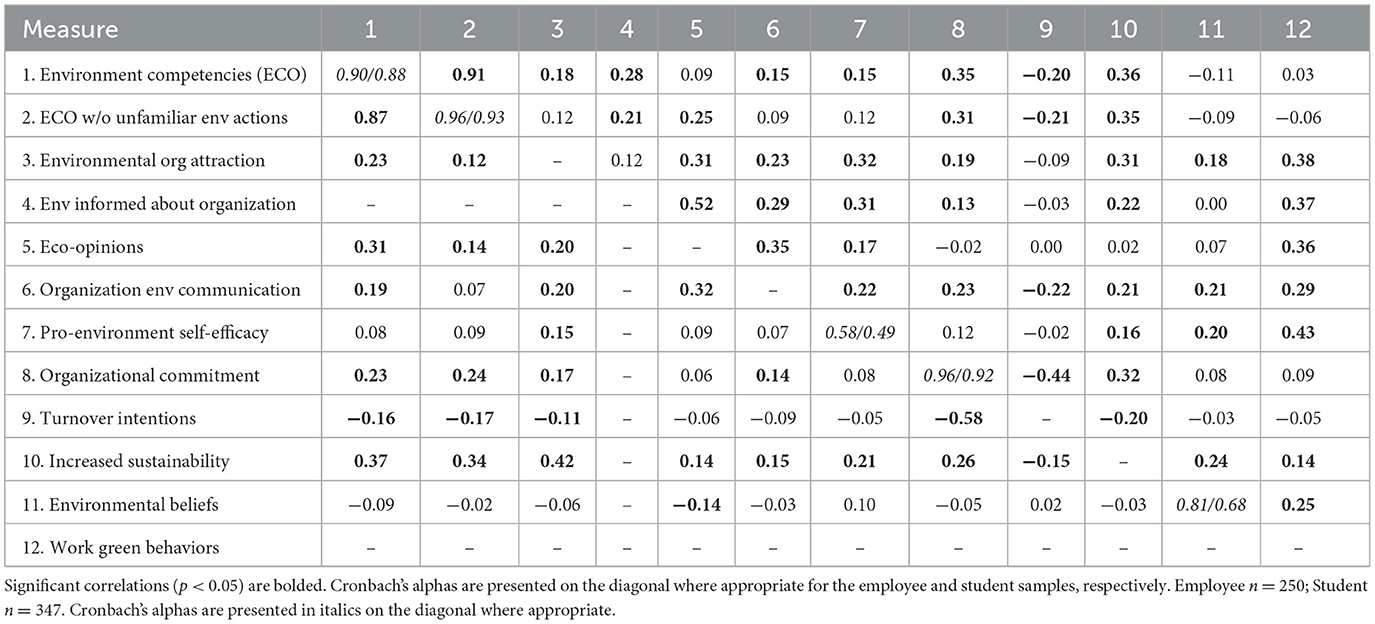
Table 2. Correlations of study variables by employee sample (above diagonal) and student sample (below diagonal).
3.2 Confirmatory factor analysis
For confirmatory factor analysis, a minimum sample size of 200 has been recommended (Hinkin, 1998). The final combined sample had 597 observations. The sample had sufficient respondents to have the recommended item-to-response ratio range of between 1:4 and 1:10 for each set of scales to be factor analyzed. The Kaiser-Meyer-Olkin (KMO) test of sampling adequacy was performed on the sample. The resultant test value was MSA = 0.93, indicating adequate sampling. In addition, the Bartlett's test of sphericity was performed to test the correlation matrix against an identity matrix. The test for the sample reached statistical significance (χ2 = 2893.77, p < 0.001), indicating items were sufficiently correlated for factor analysis.
We conducted a confirmatory factor analysis (CFA) using the Lavaan package in R (Rosseel, 2012) to test the 3-factor fit of the identical structure to what was retained during the EFA on a different pilot sample (see Supplementary materials). The CFA used maximum likelihood (FIML) to handle missing data. The fit indices are presented in Table 4. The model demonstrated acceptable fit [χ2(41) = 136.48, p < 0.001, CFI = 0.97, TLI = 0.96, RMSEA = 0.06] with fit indices meeting or exceeding the conventional thresholds (Hu and Bentler, 1999). Standardized factor loadings were strong, ranging from 0.58 to 0.84 across the three factors. All parameter estimates were statistically significant (p < 0.001).
Because we did not initially conceptualize the scale as having multiple factors, we decided to test the same 3-factor model in a second-order CFA to test whether a single higher-order factor (ECO) would account for the relationships among the first three first-order factors. The fit indices for this model are also presented in Table 4, and the model with factor loadings is displayed in Figure 2. This model also yielded acceptable fit [χ2(41) = 136.49, p < 0.001, CFI = 0.97, TLI = 0.96, RMSEA = 0.06], suggesting that the measure may be scored by a composite that includes all items. Based on the item loadings (see Figure 2), we refer to the first factor as “Energy & Infrastructure,” corresponding to the item's energy efficiency, renewable energy, and green buildings. We refer to the second factor as “Green Resources,” corresponding to the items landscaping, water conservation, waste reduction, sustainable purchasing, travel and commuting, and green investing. We refer to the third factor as “Education,” corresponding to environmental education and training, and pro-environmental advocacy, lobbying, or promotion. We had no hypotheses regarding differences or similarities in the magnitude of correlations between these factors and other measures. However, in an exploratory analysis across the full sample, each of the three factor scores correlated similarly with respect to statistical significance and direction with the other variables in this study, although their magnitudes sometimes differed.
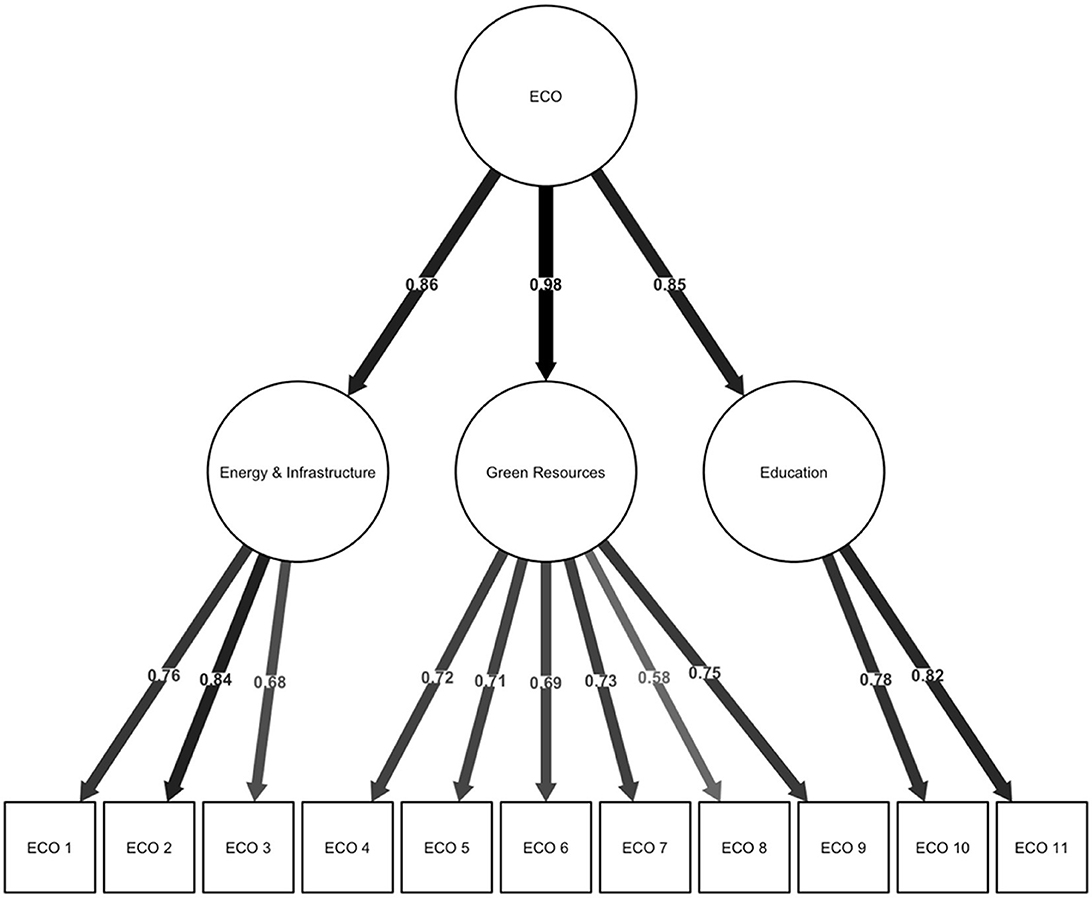
Figure 2. Confirmatory factor analysis (CFA) for 3 factor second-order model. N = 597. χ2(41) = 136.49, p < 0.001, CFI = 0.97, TLI = 0.96, RMSEA = 0.06.
3.3 Hypothesis testing
Table 3 provides the correlations for the combined sample of students and employees and is the basis for the tests for Hypotheses 1 through 7. Figure 3 provides a summary of these predictions and findings. We also provide Table 2 for supplemental purposes, which splits the correlation matrix into the employee and student samples, respectively.
As predicted, for Hypothesis 1, more consideration of sustainability in choosing to join the organization was associated with higher appraisals of the organization's environmental competencies (r = 0.24, p < 0.001, n = 592). Hypothesis 2 was only tested on the employee sample, due to the item about being informed about the environmental actions at the university only being included in this sample. Hypothesis 2 was supported in that the more opinions employees provided for competency ratings (i.e., eco-opinions) the more informed overall they reported being about environmental actions at the university (r = 0.52, p < 0.001, n = 246). Hypothesis 3 was supported in that the more reported communication sources of environmental information from the organization, the more opinions internal stakeholders provided for the competencies (i.e., eco-opinions; r = 0.31, p < 0.001, n = 597).
Hypothesis 4 was not supported, with environmental competencies and pro-environmental self-efficacy unrelated (r = 0.02, p = 0.586, n = 597). Support was found for Hypothesis 5; more positive appraisals of environmental competencies in the organization associated with higher organizational commitment (r = 0.22, p < 0.001, n = 597). Hypothesis 6 was supported with more positive appraisals of environmental competencies associated with lower turnover intentions (r = −0.22, p < 0.001, n = 596). Support for Hypothesis 7a was found, such that those with more positive appraisals of environmental competencies also reported having increased green behaviors more since joining (r = 0.37, p < 0.001, n = 588). Hypothesis 7b was only tested on employees (students were not asked about work behaviors), and there was no relationship between appraisals of environmental competencies and the amounts of reported environmental behaviors at work (r = 0.02, p = 0.685, n = 250).
Results that involve environmental competencies for organizations (ECO) are reported with and without competencies that were not familiar to the participant (i.e., DKs). The significance of these correlational predictions did not change when unfamiliar competencies were excluded (see Table 3 ECO w/o unfamiliar actions). Having a middle neutral scale point may be sufficient for future use, and it may not be necessary to include an option indicating an action is unfamiliar unless, of course, it is part of the research questions.
To test the hypotheses that the effects of organizational appraisals depend on participants' personal environmental beliefs, a series of regression models were fit. In each, the outcome was regressed onto the organizational appraisal (ECO), personal environmental beliefs, their interaction, the proportion of non-DK responses (i.e., eco-opinions) and a contrast-coded variable controlling for the participant's role (i.e., −0.5 for student, +0.5 for employee). We decided to include the variable proportion of non-DK responses in these models to account for the fact that there was a relatively high number of DK responses to some of the ECO items (ranging from 15% to 60%). With our scoring of DKs as 3.5, participants who provided many DKs would have ECO scores close to 3.5 with compressed variance. Since this proportion of DKs variable was meaningfully related to other central variables (e.g., environmental behaviors at work), we decided to include it as a covariate in our models. Additionally, although we did not hypothesize systematic differences between the students and employees, we wanted to account for the fact that these groups may differ in terms of their relationship to the organization (e.g., organizational commitment and turnover intentions). The results, in terms of significant effects, did not differ regardless of whether these two covariates were included in the models.
Table 5 presents the results for our hypothesized interaction between ECO and environmental beliefs predicting organizational commitment. In step 1, we entered the main effects of each predictor. In step 2, the interaction component was entered. The ECO measure was positively associated with organizational commitment, indicating that the more positive evaluations participants provided, the more commitment to the organization they reported. Role (student or employee) also had a main effect such that employees reported greater organizational commitment than students. In step 2, where the interaction was included, Hypothesis 8 was not supported, such that environmental beliefs did not interact with ECO to predict organizational commitment (although this interaction reached close to marginal significance, p = 0.173 and was in the hypothesized direction; for descriptive purposes, this interaction is plotted in Figure 4).
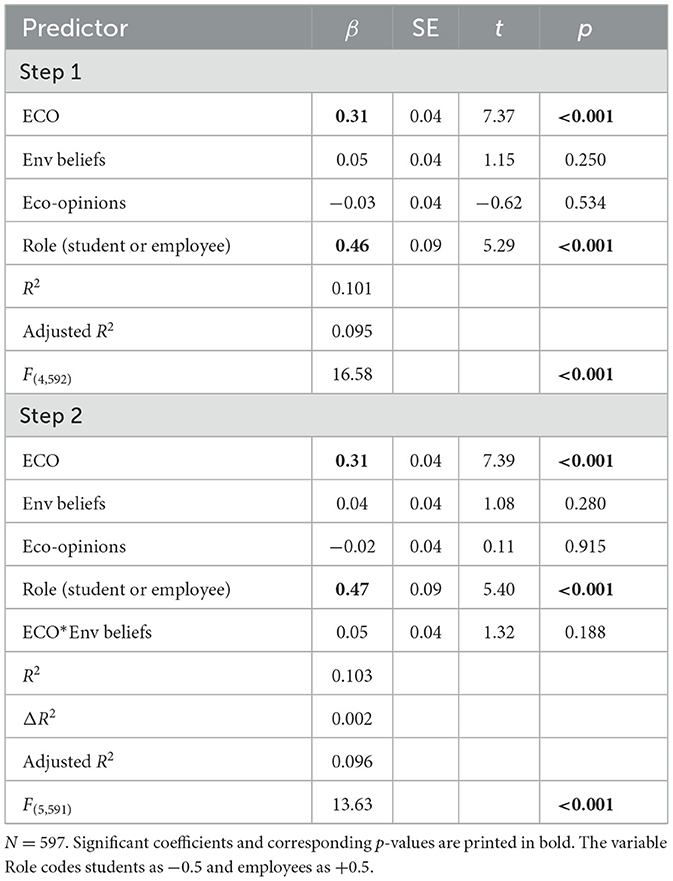
Table 5. Effects of environmental competencies for organizations (ECO) on organizational commitment with moderation by environmental beliefs (H8).
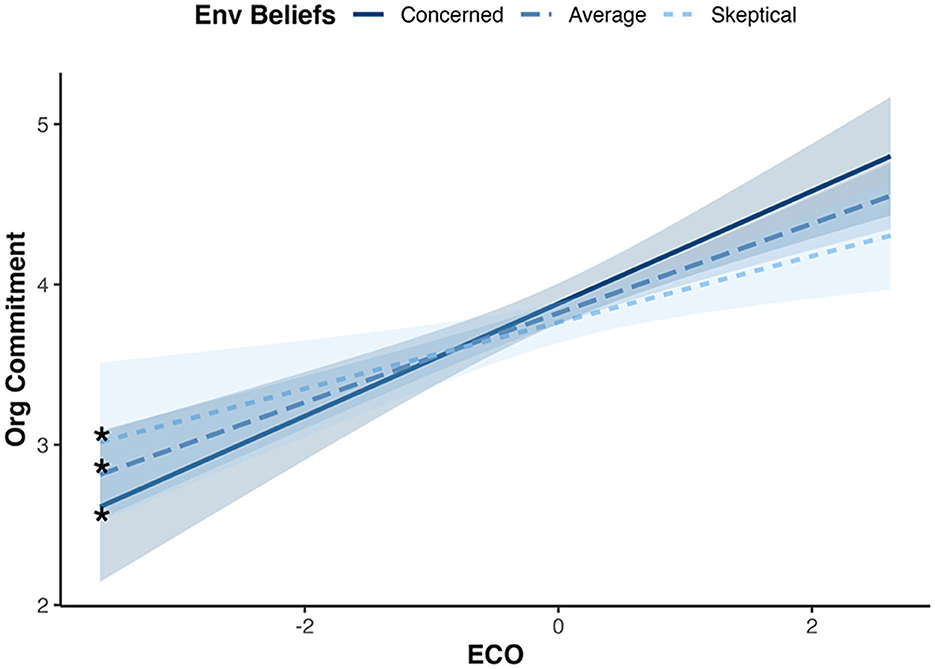
Figure 4. Interactive effects of ECO and environmental beliefs on organizational commitment. N = 597. * indicates a slope that is significantly different from 0.
Table 6 presents the results for our hypothesized interaction between ECO and environmental beliefs predicting turnover intentions following the same approach as above. Again, ECO had a main effect on turnover intentions such that those who reported more positive appraisals of the organization's environmental actions reported less intent to leave the organization. Interestingly, role also had a main effect, with employees expressing greater turnover intentions than students. In step 2, where the interaction was added, environmental beliefs and ECO interacted to predict turnover intentions, such that the negative effect of ECO on turnover intentions increased as participants reported more concerned environmental beliefs. Figure 5 plots this interaction and simple slopes tests revealed that that while participants with average- and concerned-levels of beliefs about the environment (at mean and +1 SD levels) reported less intent to turnover with more positive appraisals about the organization's environmental effectiveness, participants with low, or skeptical beliefs about the environment (−1 SD) did not show this pattern. These results support Hypothesis 9.
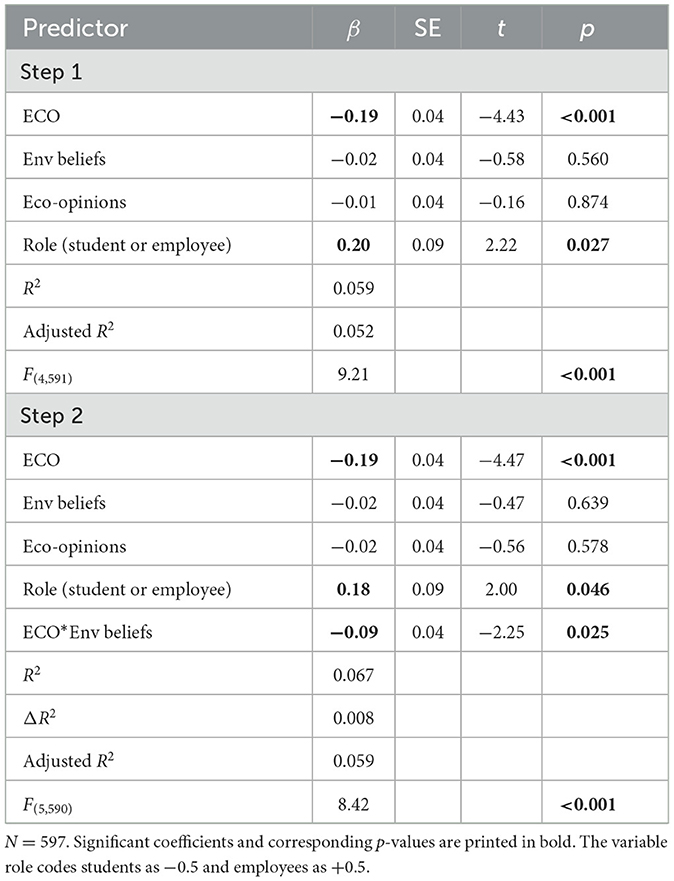
Table 6. Effects of environmental competencies for organizations (ECO) on turnover intentions with moderation by environmental beliefs (H9).
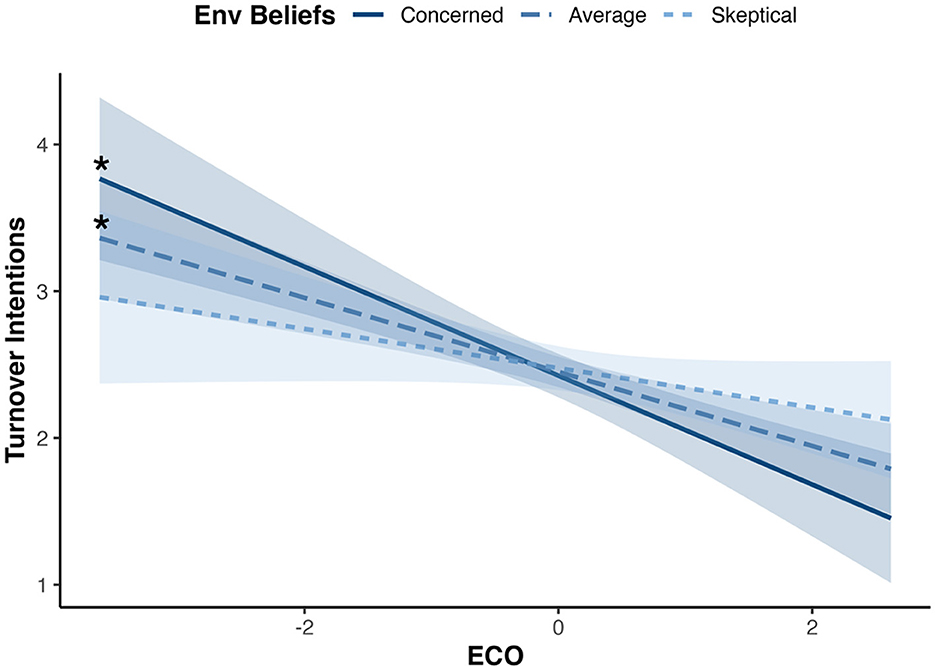
Figure 5. Interactive effects of ECO and environmental beliefs on turnover intentions. N = 597. * indicates a slope that is significantly different from 0.
4 Discussion
This study expanded on the psychological system of internal stakeholder perceptions of environmental sustainability and considered the growing importance of sustainability for organizational strategy. We started by developing items that asked about 11 broad environmental competencies, which were categorized by factor analysis into three factors of energy and infrastructure, administration of green resources, and education. Results found that the level of the appraisals of environmental competencies in organizations had important relationships with attracting and keeping organization members and organization members' sense of green behaviors.
Many organization members indicated that they were unfamiliar with some environmental dimensions by responding with “don't know” (DK) and not expressing an eco-opinion. It is reasonable that stakeholders may be unaware of areas that they are not involved in or areas not easily observed such as green investing or purchasing. The proportion of eco-opinions could also indicate a gap in communication however, as stakeholders with more information sources gave more voice to the eco-opinions. However, both proportion of eco-opinions, and the number of organizational environmental communication sources correlated significantly and positively with employee green work behaviors, further alluding to the importance of sharing information, communication, and knowledge.
Another compelling result is how individual beliefs (e.g., climate skeptic or climate concerned) moderated some findings. This supports the importance of considering individual differences in understanding environmental sustainability in organizations. Surprisingly, pro-environmental self-efficacy, another individual difference variable was not related to appraisals of environmental competencies. Self-efficacy (or personal control) is a key aspect of the theory of planned behavior (Ajzen, 1991) and meta-analysis finds moderate correlations (average r = 0.32) with employee green behavior (Katz et al., 2022). While it could be due to the unusually low internal consistency of the items with a Cronbach's alpha was 0.49 for students and 0.58 for employees, pro-environmental self-efficacy may also may be uniquely influenced by role variables and context effects.
4.1 Limitations and future directions
While we used a systems model to frame the study, the interpretations here are bounded by data collection from individuals at a single time point. Collecting longitudinal data from individuals, perhaps with a quasi-experiment involving planned interventions or involving unplanned changes, would provide better evidence for cause-and-effect conclusions. Data collection across time would improve insights relating to the sequencing of inputs, throughputs, and outputs, as well as understanding feedback loops and other system interdependencies.
As more attention is paid to connecting and specifying competencies and behaviors, scale refinements should continue. For example, sustainable purchasing might be better called sustainable sourcing, suggesting that not all materials have to be purchased. Additionally, we see the value of adding an additional competency around prioritizing foods with low environmental impact (e.g., plant based, low processing, organic). There are potentially other competencies beyond our scale for organizations that aim to increase environmental sustainability. While the ECO focuses on the effectiveness of an organization's environmental actions, some organizations may choose to focus on limiting the negative impacts of a changing environment through a resilience or adaptation focus, and these were not considered in our domain of environmental competencies.
Additionally, environmental competencies are likely context sensitive, if not context dependent. Large differences exist among various universities as well as differences from organizations in general. Universities as a group vary widely on financial resources, growth-motives vs. humanitarian mission, government influence and independence to implement pro-environmental changes. Universities also have members who are educated, and education level has been found to be associated, although weakly, with more employee green behavior (Katz et al., 2022). Compared to employees, students also have a time-limited tenure at the university, and may also have different expectations of involvement and, as mentioned, self-efficacy for enacting pro-environmental changes. While the patterns of results between employees and students were similar, future work is needed to generalize to other universities and organizational settings.
4.2 Implications
This paper focused on psychological variables that are inputs, throughputs, and outputs related to environmental sustainability in an organizational system. Systems theories are useful for taking a holistic perspective that incorporates interconnections and feedback loops but does not offer specific prescriptions on causal pathways. Open systems theory is a useful macro framework in that it allows the complexity and interconnectedness of factors within and outside an organism. The open systems rely on continual adjustments for equilibrium and adaptation when needed. An organization survives and grows to the extent the process continues to reverse entropy, that is, reducing the disorder and uncertainty in the system. Organizations have choices as to how their resources (inputs) are used (transformed) to create outputs. As such, a system can have equifinality, that is, a particular outcome might be reached through various pathways (Katz and Kahn, 1978). Or, more simply, there are potentially many routes to reach same goal or outcome.
Thus, future work could broaden the systems model to integrate the observable system of inputs and outcomes with the psychological systems mentioned in Figure 1. This could be done by connecting the ECO to other psychological constructs across organizational levels (e.g., organizational climate, structure, strategy) as well as linking with observable systems and artifacts (e.g., green behaviors, policies, rewards, resources, green HR, visible signs). Objective and subjective performance measures are each valuable. Opinions on the amounts of greenhouse gas emissions released, for example, do not substitute for tracking the amounts released into the environment. There is likely synergy for subjective and objective information being studied together, similar to work safety research (Morrow and Crum, 1998), where perceptions of safety accounted for substantial variation in key metrics over and above objective safety measures. With systems theory as a macro framework, particular micro and meso focused theories can be nested inside systems models to make more focused predictions and test cause and effect relationships. In addition to concepts tested in this paper, Kühner et al. (2025) offer many compelling recommendations for other micro and meso level theories (e.g., goal hierarchies, leadership, work design, career theories, social identity) to apply to research on sustainability, and, we believe, these approaches would fit nicely with systems thinking.
In addition to research uses, the ECO scale could be applied to assess stakeholders' perspectives of pro-environmental efforts and ultimately assist with diagnosing and modifying an organization's pro-environmental efforts. The scale could be used for benchmarking or to indicate gaps between the current and desired states. The factor structure yielded from our analyses might further support organizations in their pro-environmental efforts, by allowing inter-factor (e.g., the education vs. energy and infrastructure components) or inter-organizational comparisons (organizations may have similar mean overall scores but differ with respect to internal stakeholders' ratings of the education component). As leaders and change agents gain insight into the system, they are better able to prioritize and leverage resources for change and increase engagement. Organizations may not be equally effective across different areas, and profile scores could start the conversation of where more efforts are needed, or where there is resistance. A low score may indicate that stakeholders are not aware of efforts and actions, and leaders may want to be more intentional in increasing communication and awareness as well as celebrating successes. Particularly in large and disperse organizations, there is the potential that stakeholders will not be informed or knowledgeable about competencies, and responses of don't know are helpful. The scale did correlate with a variety of important concepts that warrant more attention. In addition to organizational commitment and turnover intentions, future work could further explore how perceptions are important for organizational reputations and part of attracting talent.
5 Conclusion
Increasing the pro-environmental actions of organizations offers the potential for significant environmental impact far above what individual green behaviors alone can accomplish. By understanding the psychological system, we can better understand and address the social-psychological barriers to an organization becoming more environmentally friendly. Beyond the organizational level, we hope that a focus on environmental competence is a step to organizations becoming more intentional and effective in creating a more environmentally sustainable world.
Data availability statement
The original contributions presented in the study are included in the article/Supplementary material, further inquiries can be directed to the corresponding author.
Ethics statement
The studies involving humans were approved by the Institutional Review Board - DePaul University. The studies were conducted in accordance with the local legislation and institutional requirements. The participants received information about the study and were informed that completing the online surveys indicated consent to participate in this study.
Author contributions
NC: Conceptualization, Data curation, Formal analysis, Methodology, Project administration, Resources, Software, Supervision, Validation, Visualization, Writing – original draft, Writing – review & editing. AS: Conceptualization, Funding acquisition, Investigation, Methodology, Project administration, Resources, Supervision, Validation, Visualization, Writing – original draft, Writing – review & editing.
Funding
The author(s) declare that no financial support was received for the research and/or publication of this article.
Acknowledgments
We gratefully acknowledge funding support from the Psychology department of DePaul University for this paper.
Conflict of interest
The authors declare that the research was conducted in the absence of any commercial or financial relationships that could be construed as a potential conflict of interest.
Generative AI statement
The author(s) declare that no Gen AI was used in the creation of this manuscript.
Publisher's note
All claims expressed in this article are solely those of the authors and do not necessarily represent those of their affiliated organizations, or those of the publisher, the editors and the reviewers. Any product that may be evaluated in this article, or claim that may be made by its manufacturer, is not guaranteed or endorsed by the publisher.
Supplementary material
The Supplementary Material for this article can be found online at: https://www.frontiersin.org/articles/10.3389/forgp.2025.1523986/full#supplementary-material
References
Abraham, J., Pane, M. M., and Chairiyani, R. P. (2015). An investigation on cynicism and environmental self-efficacy as predictors of pro-environmental behavior. Psychology 6, 234–242. doi: 10.4236/psych.2015.63023
Ajzen, I. (1991). The theory of planned behavior. Organiz. Behav. Hum. Decis. Process. 50, 179–211. doi: 10.1016/0749-5978(91)90020-T
Baldwin, C., Pickering, G., and Dale, G. (2023). Knowledge and self-efficacy of youth to take action on climate change. Environ. Educ. Res. 29, 1597–1616. doi: 10.1080/13504622.2022.2121381
Bandura, A. (1997). Self-Efficacy: The Exercise of Control. New York, NY: W. H. Freeman and Company.
Conway, J. M., and Huffcutt, A. I. (2003). A review and evaluation of exploratory factor analysis practices in organizational research. Organiz. Res. Methods 6, 147–168. doi: 10.1177/1094428103251541
Davis, M. C., Challenger, R., Jayewardene, D. N. W., and Clegg, C. W. (2014). Advancing socio-technical systems thinking: a call for bravery. Appl. Ergon. 45, 171–180. doi: 10.1016/j.apergo.2013.02.009
DeSimone, J. A., and Harms, P. D. (2018). Dirty data: the effects of screening respondents who provide low-quality data in survey research. J. Business Psychol. 33, 559–577. doi: 10.1007/s10869-017-9514-9
Faraz, N. A., Ahmed, F., Ying, M., and Mehmood, S. A. (2021). The interplay of green servant leadership, self-efficacy, and intrinsic motivation in predicting employees' pro-environmental behavior. Corp. Soc. Responsib. Environ. Manag. 28, 1171–1184. doi: 10.1002/csr.2115
Flagstad, I., Johnsen, S., and Rydstedt, L. (2021). The process of establishing a green climate: face-to-face interaction between leaders and employees in the microsystem. J. Values Based Leadersh. 14, 1–28. doi: 10.22543/0733.141.1343
Gist, M. E., and Mitchell, T. R. (1992). Self-efficacy: a theoretical analysis of its determinants and malleability. Acad. Manag. Rev. 17, 183–211. doi: 10.2307/258770
Glavas, A., and Kelley, K. (2014). The effects of perceived corporate social responsibility on employee attitudes. Business Ethics Quart. 24, 165–202. doi: 10.5840/beq20143206
Hinkin, T. R. (1998). A brief tutorial on the development of measures for use in survey questionnaires. Organiz. Res. Methods 1, 104–121. doi: 10.1177/109442819800100106
Hu, L. T., and Bentler, P. M. (1999). Cutoff criteria for fit indexes in covariance structure analysis: conventional criteria versus new alternatives. Struct. Equ. Model. 6, 1–55.
Imundo, M. N., and Rapp, D. N. (2022). When fairness is flawed: effects of false balance reporting and weight-of-evidence statements on beliefs and perceptions of climate change. J. Appl. Res. Mem. Cogn. 11, 258–271. doi: 10.1016/j.jarmac.2021.10.002
Johnson, A. E., and Wilkinson, K. K., (eds.). (2020). All We Can Save: Truth, Courage, and Solutions for the Climate Crisis. New York, NY: One World.
Jones, D. A., Willness, C. R., and Heller, K. W. (2016). Illuminating the signals job seekers receive from an employer's community involvement and environmental sustainability practices: Insights into why most job seekers are attracted, others are indifferent, and a few are repelled. Front. Psychol. 7:426. doi: 10.3389/fpsyg.2016.00426
Jones, G. R. (1986). Socialization tactics, self-efficacy, and newcomers' adjustments to organizations. Acad. Manag. J. 29, 262–279. doi: 10.2307/256188
Katz, I. M., Rauvola, R. S., Rudolph, C. W., and Zacher, H. (2022). Employee green behavior: a meta-analysis. Corp. Soc. Responsib. Environ. Manag. 29, 1146–1157. doi: 10.1002/csr.2260
Klein, H. J., Cooper, J. T., Molloy, J. C., and Swanson, J. A. (2014). The assessment of commitment: advantages of a unidimensional, target-free approach. J. Appl. Psychol. 99, 222–238. doi: 10.1037/a0034751
Kristof-Brown, A., Schneider, B., and Su, R. (2023). Person-organization fit theory and research: conundrums, conclusions, and calls to action. Pers. Psychol. 76, 375–412. doi: 10.1111/peps.12581
Kühner, C., Hüffmeier, J., and Zacher, H. (2025). Environmental sustainability at work: It's time to unleash the full potential of Industrial and Organizational psychology. Indus. Org. Psychol. doi: 10.1017/iop.2025.10015
Kumar, V., and Christodoulopoulou, A. (2014). Sustainability and branding: an integrated perspective. Indus. Market. Manag. 43, 6–15. doi: 10.1016/j.indmarman.2013.06.008
Latham, G. P., and Sejits, G. H. (2016). Similarities and differences among performance, behavioral, and learning goals. J. Leadersh. Organiz. Stud. 23, 225–233. doi: 10.1177/1548051816641874
Lyon, T. P., and Montgomery, A. W. (2015). The means and end of greenwash. Organiz. Environ. 28, 223–249. doi: 10.1177/1086026615575332
Mathieu, J. E., and Zajac, D. M. (1990). A review and meta-analysis of the antecedents, correlates, and consequences of organizational commitment. Psychol. Bull. 108, 171–194. doi: 10.1037/0033-2909.108.2.171
Morrow, P. C., and Crum, M. R. (1998). The effects of perceived and objective safety risk on employee outcomes. J. Vocat. Behav. 53, 300–313. doi: 10.1006/jvbe.1997.1620
Nadler, D. A. (1987). “The effective management of organizational change,” in Handbook of Organizational Behavior, ed. J. W. Lorsch (Englewood Cliffs, NJ: Prentice-Hall), 358–369.
Norton, T. A., Zacher, H., and Ashkanasy, N. M. (2015). “Pro-environmental organizational culture and climate,” in The Psychology of Green Organizations, eds. J. L. Robertson and J. Barling (New York, NY: Oxford University Press), 322–348. doi: 10.1093/acprof:oso/9780199997480.003.0014
Norton, T. A., Zacher, H., Parker, S. L., and Ashkanasy, N. M. (2017). Bridging the gap between green behavioral intentions and employee green behavior: the role of green psychological climate. J. Organiz. Behav. 38, 996–1015. doi: 10.1002/job.2178
Raineri, N., and Paillé, P. (2016). Linking corporate policy and supervisory support with environmental citizenship behaviors: the role of employee environmental beliefs and commitment. J. Business Ethics 137, 129–148. doi: 10.1007/s10551-015-2548-x
Ramus, C. A., and Steger, U. (2000). The roles of supervisory support behaviors and environmental policy in employee “eco-initiatives” at leading-edge European companies. Acad. Manag. J. 43, 605–626. doi: 10.2307/1556357
Robertson, J. L., Montgomery, A. W., and Ozbilir, T. (2023). Employees' response to corporate greenwashing. Business Strat. Environ. 32, 4015–4027. doi: 10.1002/bse.3351
Rosseel, Y. (2012). Lavaan: an R package for structural equation modeling. J. Stat. Softw. 48, 1–36. doi: 10.18637/jss.v048.i02
Schneider, B. (1987). The people make the place. Pers. Psychol. 40, 437–453. doi: 10.1111/j.1744-6570.1987.tb00609.x
Schneider, B. (2001). Fits about fit. Int. Rev. Appl. Psychol. 50, 141–152. doi: 10.1111/1464-0597.00051
Schutte, N. S., and Bhullar, N. (2017). Approaching environmental sustainability: perceptions of self-Efficacy and changeability. J. Psychol. 151, 321–333. doi: 10.1080/00223980.2017.1289144
Spector, P. E., Dwyer, D. J., and Jex, S. M. (1988). Relation of job stressors to affective, health, and performance outcomes: a comparison of multiple data sources. J. Appl. Psychol. 73, 11–19. doi: 10.1037/0021-9010.73.1.11
Stern, P. C., Dietz, T., Abel, T., Guagnano, G. A., and Kalof, L. (1999). A value-belief-norm theory of support for social movements: the case of environmentalism. Hum. Ecol. Rev. 81–97.
Strauss, K., Lepoutre, J., and Wood, G. (2017). Fifty shades of green: how microfoundations of sustainability dynamic capabilities vary across organizational contexts. J. Organiz. Behav. 38, 1338–1355. doi: 10.1002/job.2186
Tabernero, C., and Hernández, B. (2011). Self-efficacy and intrinsic motivation guiding environmental behavior. Environ. Behav. 43, 658–675. doi: 10.1177/0013916510379759
The Climate-Conscious College (2023). The Chronicle of Higher Education. Available online at: https://www.chronicle.com/article/the-climate-conscious-college
Tilleman, S. (2012). Is employee organizational commitment related to firm environmental sustainability? J. Small Business Entrepr. 25, 417–431. doi: 10.1080/08276331.2012.10593582
Turban, D. B., and Greening, D. W. (1997). Corporate social performance and organizational attractiveness to prospective employees. Acad. Manag. J. 40, 658–672. doi: 10.2307/257057
Turker, D. (2009). How corporate social responsibility influences organizational commitment. J. Business Ethics 89, 189–204. doi: 10.1007/s10551-008-9993-8
UNDP (2024). Sustainable Development Goals. Available online at https://www.undp.org/sustainable-development-goals (Accessed November 1, 2024).
University of New Hampshire Sustainability Institute (2017). Student and Employee Culture Surveys. University of New Hampshire Sustainability Institute. [Unpublished manuscript].
Welch, M., and Jackson, P. R. (2007). Rethinking internal communication: a stakeholder approach. Corp. Commun. Int. J. 12, 177–198 doi: 10.1108/13563280710744847
Appendix
Environmental Competencies for Organizations (ECO) Scale
Instructions. This survey asks about actions that [Organization] is taking to be pro-environmental. Actions that are pro-environmental are environmentally sustainable and reduce climate change. You may or may not be familiar with some of the actions, issues, and items. That is OK. Some activities may actually overlap across areas. Simply respond with your current beliefs and understanding. If you have no idea, you may choose the “Don't Know” option. [Organization] takes effective pro-environmental actions in these areas:
1. Energy efficiency (heating, cooling, electricity)
2. Renewable energy
3. Green buildings
4. Landscaping (includes choices for chemicals, plants, water use)
5. Water conservation
6. Waste reduction (includes recycling, eliminating packaging, avoiding food waste, composting)
7. Sustainable purchasing (prioritizing reusable, local suppliers, recycled material)
8. Travel and commuting (limiting emissions from travel, cutting air travel, supporting public transportation, walking, biking, carpooling)
9. Green investing (e.g., endowment prioritizes environmentally friendly companies and funds)
10. Environmental education and training
11. Pro-environmental advocacy, lobbying, or promotion
Response scale of 1 (Strongly disagree) to 6 (Strongly agree) plus option of “Don't Know” was used.
Keywords: environmental sustainability, environmental competencies, pro-environmental action, organizational change, systems theory
Citation: Carruth NP and Stuhlmacher AF (2025) Appraising environmental competencies in organizations: scale development and relevance for internal stakeholders. Front. Organ. Psychol. 3:1523986. doi: 10.3389/forgp.2025.1523986
Received: 06 November 2024; Accepted: 09 July 2025;
Published: 01 August 2025.
Edited by:
Leonor Maria Gonçalves Pacheco Pais, University of Coimbra, PortugalReviewed by:
Silvia Lopes, University of Coimbra, PortugalSusana Alves Pereira, University of Coimbra, Portugal
Copyright © 2025 Carruth and Stuhlmacher. This is an open-access article distributed under the terms of the Creative Commons Attribution License (CC BY). The use, distribution or reproduction in other forums is permitted, provided the original author(s) and the copyright owner(s) are credited and that the original publication in this journal is cited, in accordance with accepted academic practice. No use, distribution or reproduction is permitted which does not comply with these terms.
*Correspondence: Nicholas P. Carruth, bnBjYXJydXRoQGdtYWlsLmNvbQ==
 Nicholas P. Carruth
Nicholas P. Carruth Alice F. Stuhlmacher
Alice F. Stuhlmacher